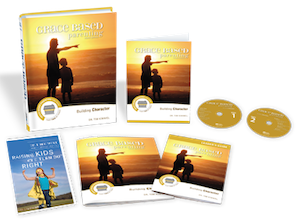Session 1 - Life Goals and Survival Skills
Here are more practical ways to parent on purpose, set life goals, and build survival skills into your kids.
Parenting On Purpose
- Keep meeting with your small group to be held accountable as you learn together.
- Prayer is one of the most important and powerful tools that a parent has to parent on purpose. The effective prayer of a righteous man (parent) can accomplish much. (James 5:16b (NASB) parenthesis added.)
- Continue to learn how to be a grace based parent by reading the set of three books that complete the Big Picture of Grace Based Parenting. (link to value pack)
- Have a weekly staff meeting with your spouse and evaluate how you are doing in modeling and teaching these character traits to your children. (If you are single, ask a friend to give you feedback on your efforts.)
Helping Our Children Set Life Goals
1. To love, fear and obey God.
- You are the high water mark on their ability to meet this goal. Model daily a love for them and God that is based on grace.
- Remember that grace based parenting is simply treating your children the way God treats His.
2. To love their spouse.
- Show them how to have a grace based marriage by treating your spouse the way God treats His spouse (The Church). Verbalize and show your love for your spouse in front of your children.
- If you are single, you have a great opportunity to speak honorably of your ex spouse to your children and to value the gift of marriage.
3. To love their own children.
- That is the reason you are doing this study on parenting because you love your children. Make sure it translates into their love language.
- How you value them will transfer into how they value your grandchildren.
4. To be a good friend.
- Friendship can be the best of times and the worst of times for a child. Encourage them to be a loyal consistent friend even when that response is not forthcoming from their friend.
- Prepare them for the fickleness of friendship and share with them the benefits of always doing the right thing for others.
5. To work hard.
- Give them age appropriate chores for which they are responsible. Make sure your instructions are clear and simple and that your expectations are realistic.
- Your attitude toward your work and your contributions to the workload at home rub off on them.
6. To serve in the church.
- As soon as they are able, get them serving at church. Even at a young age, a child can help pick up the toys and craft supplies in their classroom.
- Your example of cheerful service will be their model. Maybe they can help you gather up the discarded bulletins at the end of the church service.
7. To empower the people around them.
- Encourage them to pray for others.
- Help them clear out their toys and clothing to give to those less fortunate.
8. To be good stewards of their God-given abilities.
- Help them identify their gifts and find ways to bless other with them.
- Whether they are an artist, musician, writer or athlete, help them to see these skills as tools that God has given them to encourage others.
Teaching Survival Skills to Our Children
Practical Skills are best transferred to our children by modeling them, by explaining and then practicing them and finally handing them over to our child for them to own. Yes, they will make mistakes but it is our job to bring them up to speed so that when they leave our home, they are prepared:
- To manage their schedules
- To swim
- To cook
- To drive defensively
- To get proper rest
- To eat properly
- To deal with an emergency
- To manage their finances by living on a budget, handling a credit card, balancing a checking account.
- To finish what they start
- To get along with others






